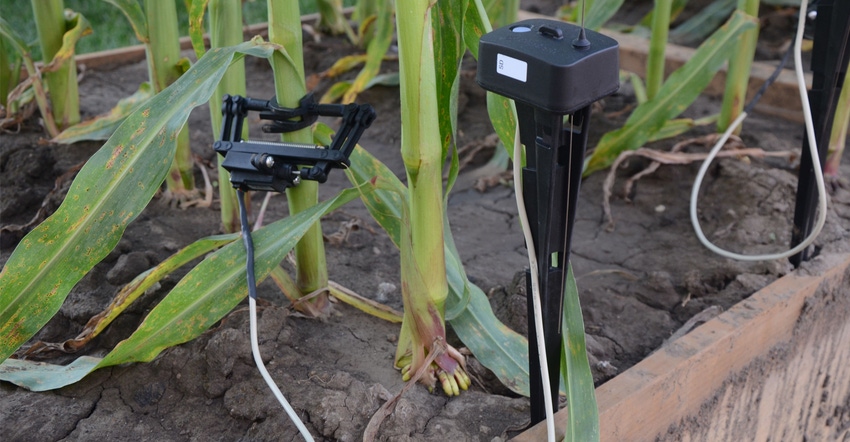
In Oren Kind's words, "Plants are kind of like human beings. If you go to a doctor, you get your temperature taken, you describe your symptoms, and you get a diagnosis," says Kind, chief compliance officer at Phytech, an Israeli-based company that develops sensors that measure movement — shrinking and swelling — in stalk diameter.
These sensors, called dendrometers, have been around for a number of years, and have been used by Phytech overseas to measure crop water stress and response to irrigation since 2002. However, 2017 marked the first year the company has worked with growers in North America in using this technology.
The dendrometer, which mounts to the stalk of a corn or soybean plant, measures movement down to the micron. Chad Scebold, director of sales and marketing for North America at Phytech, notes for reference, that a strand of human hair is about 100 microns wide.
"We measure shrink and swell, each hour on the hour throughout the day. So you have 24 data points per day," says Scebold.
What does this mean for plant health? Plants shrink and swell in response to different levels of water stress. For example, in the cooler mornings of the Midwest and Great Plains, a soybean plant is cool and relaxed with a swollen diameter. In the heat of the day in midsummer, the plant will likely be more stressed, and the stalk diameter shrinks.
Phytech dendrometers send a radio signal to a data logger unit at the edge of the field or the pivot point that the grower can connect to via the cloud through a smartphone app or through the Phytech website. "Stress alerts" give a real-time indication of how stressed the crop is in certain areas of the field based on the readings it takes at the individual plant level.
For example, if the app displays a red section on a center pivot, it's an indication of water stress based on the change in stalk diameter. A green section indicates the recommended range for optimum yield, while yellow indicates mild, but not yield-limiting, stress.
"We know based on stalk thickness, that if it shrinks too much to a certain threshold — the app will show that section of the pivot red or yellow," Scebold says. However, there are additional data layers for growers who want to dig into environmental factors affecting soil moisture content and evapotranspiration. "It's like peeling back the layers of the onion. On the research side, you can dig deeper, all the way to individual plant behavior."
The dendrometers are manufactured in Israel and assembled in the U.S., but Phytech also uses Decagon capacitance probes in conjunction with dendrometers to keep track of how much water is available to the crop in the soil profile. The Phytech app and website also provide daily evapotranspiration and ambient air temperature data collected by local National Oceanic and Atmospheric Administration weather stations, and can project how the plant will respond over the next four days based on historic ET and temperature data.
Using this information, Kind says irrigators can adjust their irrigation scheduling accordingly to meet crop needs and monitor crop water stress in real-time, rather than watching for stress symptoms with the naked eye, which may take several days to appear. "We decided if we have technology, we have to have a goal, and it has to change management practices," Kind says. "The goal is to listen to the plant in real-time and determine what it wants."
Phytech sensor systems come in two suites. A basic system for $1,950 includes the installation of six sensors, two capacitance probes and a data logger unit beneath a center pivot. An "ultraprecision" package for $2,850 includes three sensors and a capacitance probe in a 90-degree section of a center pivot, with a total of four probes and 12 sensors per pivot.
The cost covers installation, and every season, local dealers partnering with Phytech will install new loggers and sensors. Phytech is working with dealers in the Great Plains states to establish a network to maintain and service these sensors. To learn more, contact Scebold at [email protected].
About the Author(s)
You May Also Like




